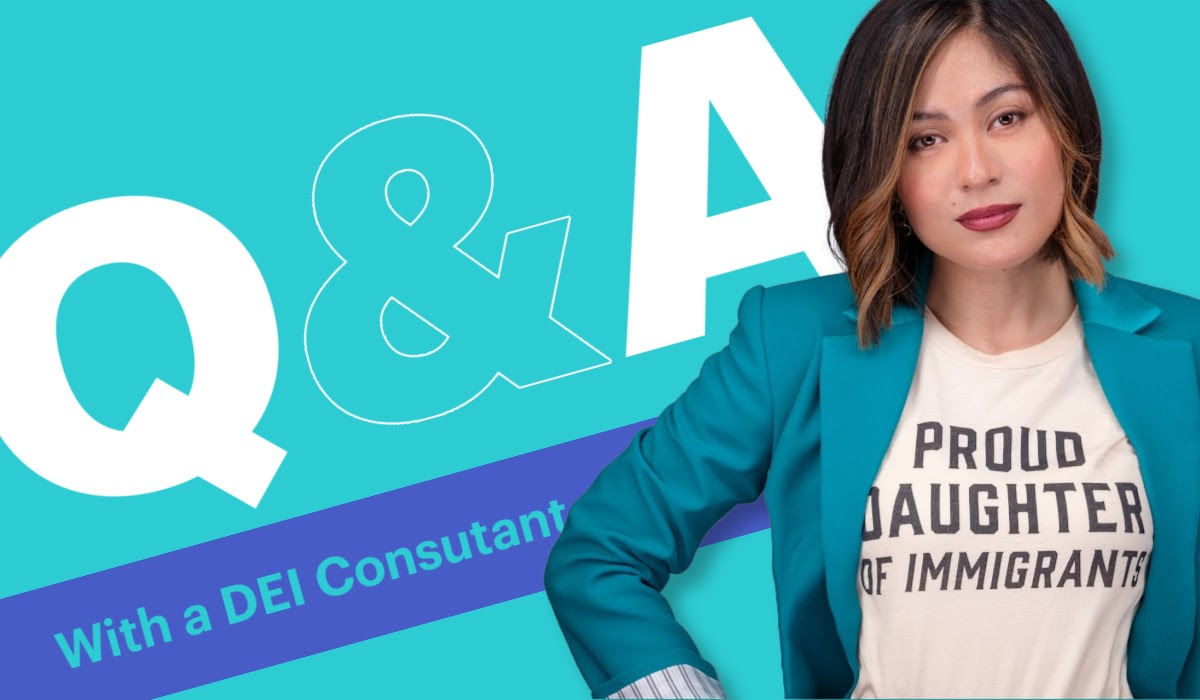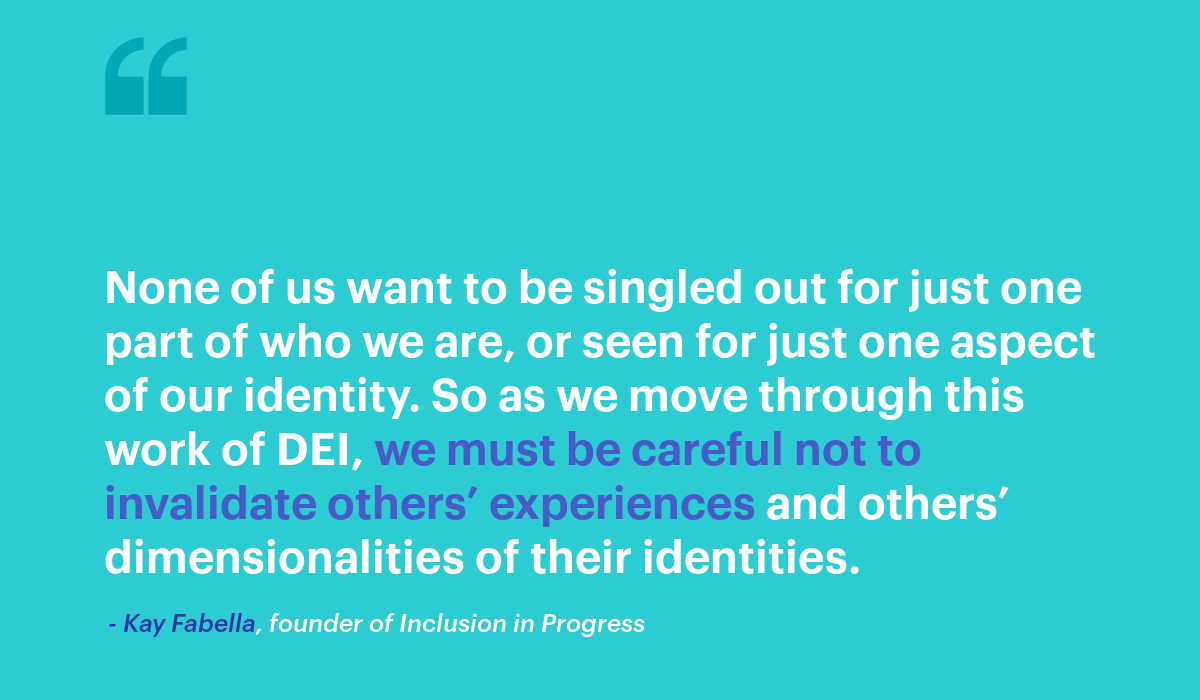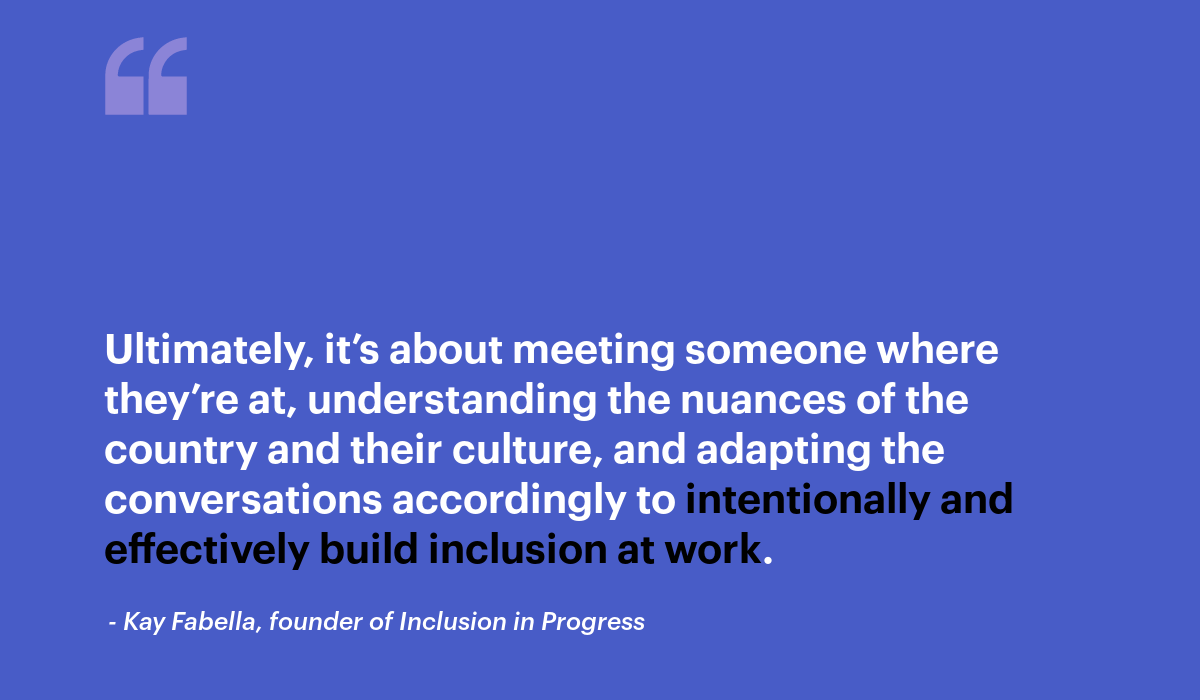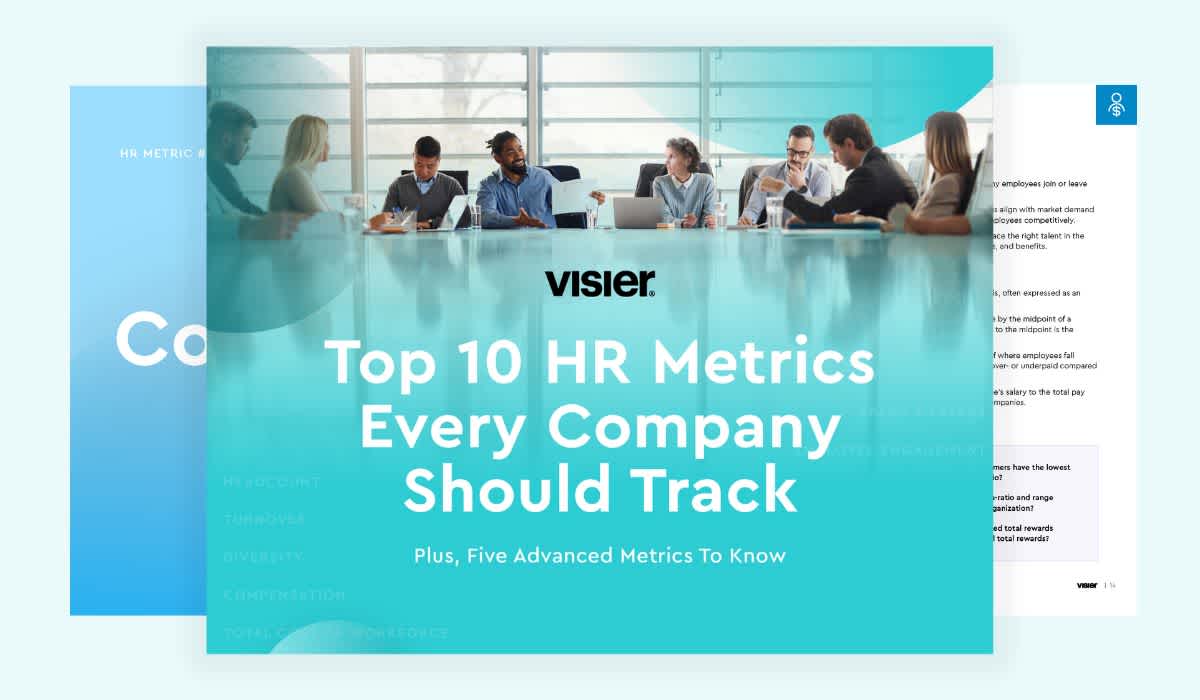Diversity in the Workplace is Different in Europe: Q&A With a DEI Consultant Based in Spain
We asked a Filipina-American DEI consultant based in Spain, what does diversity in the workplace look like in Europe? Read her insights here.

We were curious to know what Diversity, Equity, and Inclusion (DEI) looks like in other, non-North American, countries so we reached out to DEI consultant Kay Fabella, a Filipina-American woman based in Spain, for her unique perspective. Kay says that her own lived experiences as a “multi-hyphenate” woman of color, a daughter of immigrants, and an immigrant herself inform her DEI work at Inclusion in Progress, a work culture consultancy and research firm she founded.
Visier: In order to understand the different approaches to DEI in Europe versus the U.S., I suppose it’s important to start with a discussion about race. How do Americans and Europeans define or relate to race and racism in different ways—for instance, the idea of country of origin or language rather than strictly skin color?
Kay Fabella: One of the things I found most striking about my time in Europe is how race is associated with the country of origin. In the U.K., for instance, European immigrants are identified as white non-British, which includes folks who come from Eastern European or Southern European countries. Anecdotally, many Eastern Europeans experience what they call racism or racial discrimination when they come to places like the U.K. where they are “othered” for their accent or cultural traditions.
When the Black Lives Matter protests began to sprout up here in Europe, many of my clients and colleagues who identified themselves as “othered” (even though they were white) immediately expressed solidarity saying, “we’ve experienced racism, too.” While they weren’t wrong, I had to find a way to give them a clearer lens into what was happening—how these protests were shaped by white supremacy—without invalidating the racism they experienced as part of a historically-excluded ethnic group in Europe.

V: That’s interesting because those nuances and distinctions are important to make, aren’t they?
KF: Structural racism is rarely addressed in schoolbooks, much less in workplaces. So in most conversations I lead, I have to draw upon the historical context of how Europe’s history with colonialism and slavery was the precursor to many of the consequences we’re seeing play out today. More importantly, I’ve taken to distinguishing the Black Lives Matter movement by referencing the role of “colorism” within racism to give clarity to European clients and counterparts.
V: In what ways does education and history affect how DEI is discussed in Europe?
From my time living in Spain, I’ve noticed that there is less of a historical emphasis or understanding of Europe’s colonial past, and how that’s shaped the current racial and socioeconomic systems we see today. In the same way much of the history I was taught growing up in the U.S. glossed over our own colonial experiments with Hawai’i, Puerto Rico, and my parents’ home country of the Philippines, barely any Europeans I’ve spoken to across generations recall learning about colonial history through a critical lens, which I suspect plays out in how uncomfortable they are with broaching the topic about race or non-European ethnicity—especially in a work setting.
V: So I suppose you’d say it’s important for you to meet your clients where they are at when it comes to understanding the importance of DEI. Is this why you’ve found an American approach to DEI doesn’t really work for companies in Spain or Sweden for example?
Different countries have different relationships, and also maturity levels with DEI. For places that are culturally older and more monocultural-oriented, such as countries in Europe or in Asia, one is already considered to have a different “culture” if you have crossed a border. Whereas for places that are more multicultural in how they’ve been built and how they’ve evolved, such as the U.S. or the U.K., there is a different understanding of what culture is and what inclusion looks like as a result, because they have already been exposed to multiple cultures within their own borders. Therefore, there is a need to create practices around DEI formed by the culture that we’ll be working with.

Kay Fabella, founder of Inclusion in Progress, leads a workshop on DEI in the workplace in Europe
V: As Americans we tend to put ourselves and our experiences at the forefront of DEI discussions (with good intentions I’m sure!) but I suppose this can sometimes backfire.
At times I’ve seen a strong resistance to “DEI” in Europe or Asia because there’s been an American hegemony for many years. So a lot of countries that are very proud of their native cultures are hesitant to adhere to anything that is perceived to be an extension of U.S. imperialism, which is how DEI sometimes tends to be interpreted in some of our experiences facilitating non-U.S. client conversations.
To our credit, I think Americans are also a lot more comfortable with leaning into conversations that need to be had when they’re difficult. This is important because of how embedded shame is in certain societies. For example, a place like Spain, doesn’t really have many conversations around race or acknowledging their role in fostering and potentially creating institutionalized racism, because of their history. It’s going to be a very different conversation from places that tend to have more of an egalitarian society, such as Sweden. Whereas Americans—more multicultural than monocultural—have had to learn to be very direct for the sake of being understood quickly because of how the culture was developed and the diversity of people present within our borders.
There’s no perfect place to have these conversations. But understanding those cultural lenses is really important. We cannot ask people to join commitments to a DEI structure that doesn’t reflect their own community, and each person defines community very differently depending on context, history, and culture.
Visier: I love the way you talk about this idea of our own cultural lenses in which we view race, gender and diversity. Can you elaborate on this?
What you find quickly as a DEI practitioner looking at the world through multiple lenses is that you can’t invalidate someone else’s experiences because it clashes with your own. Especially when you’re talking about longstanding cultural dynamics and differences that were passed down before your own birth country existed. But ultimately it’s about meeting someone where they’re at, understanding the nuances of the country and their culture, and adapting the conversations accordingly to intentionally and effectively build inclusion at work.
We all hold multiple identities. We have to realize that this idea of walking in someone’s shoes doesn’t exist. For example, I am a woman of color, but I can’t say what it’s like to be a Black woman in Northern Europe. I can’t walk a mile in her shoes, because that’s just not possible. The same way I can’t walk a mile in the shoes of a person who is trans and lives in a culture where disclosure is a real danger to their safety.

So this idea of having our own cultural lenses, the way that I see it is, you have these goggles that are soldered onto your eyes and no matter which way you turn, no matter how skilled you are at empathy, or compassion, or even just trying to understand how another person’s perspective is, you’re only seeing a snapshot moment of that person based off of their physicality, or their accent, or how many limbs they have.
Visier: You’re saying that we all have to remember that what’s true for us personally isn’t necessarily true for someone else, and vice versa—just because we don’t experience something doesn’t mean it doesn’t exist.
We all have multiple realities that we are all living, especially now, as we’re navigating the pandemic, and all of us do not necessarily have the same sense of what is and isn’t true.
So it’s important to recognize that not only do our experiences exist beyond our own understanding or knowledge, but also that we’re seeing a snapshot of one person’s experience in the moment we’re interacting with them. Which means we have to give them grace.
None of us want to be singled out for just one part of who we are, or seen for just one aspect of our identity. So as we move through this work of DEI, we must be careful not to invalidate others’ experiences and others’ dimensionality of their identities.

V: You’ve said that EU laws prohibit companies to collect data on race, gender, sexual orientation etc. because of the horrific history of persecution of Jews with the Star of David. Is it important (and is it even possible?) for European companies to get around this to stay accountable and use diversity data in a positive way rather than as a weapon of discrimination?
I don’t think a lot of people realize, until I share with them that the reason why gathering data is nearly impossible in places like Germany or France is because of World War II and the Holocaust. A lot of people tend to forget our history.
Of course, there needs to be a larger body of ethics and practices to ensure that this research is gathered in a way that offers consent and collaboration. More importantly, that engagement—of how you gather that data, and where it’s going to be used, and how it ultimately serves people—that needs to be done through socializing the idea in a way that’s beneficial to everybody, while being transparent about the process all the way through.
V: So this goes back to your point about the importance of viewing DEI in a cultural context. Is it fair to assume that a traumatic history impacts the way some Europeans view or approach DEI?
What DEI professionals are seeing is that you have to socialize the idea of why you’re gathering this data, to not only your employees, but also your company. Then you need to say how it’s aligned with the larger conversation and strategy around DEI and in revealing the gaps in the organization and where they can improve in offering equity and inclusion.
And hopefully, over time, as the work deepens and progresses, we’ll see more efforts at the state level [in various European countries] to support gathering employee data in a way that’s ethical and provides more insight into how we can raise the floor for those who haven’t historically had access to work in the first place.


